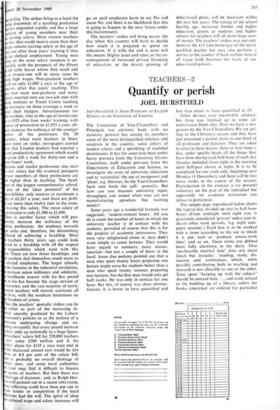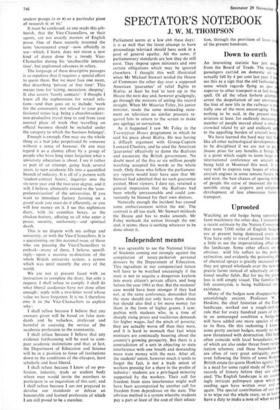TEACHERS-2
Quantify or perish
JOEL HURSTFIELD
Joel Hurst field is Astor Professor of English History in the University of London.
The Committee of Vice-Chancellors and Principals (an advisory body with no statutory powers) has among its members some of the most distinguished scholars and scientists in the country, some others of modest talents and a sprinkling of muddled doctrinaires. It has for some time been under heavy pressure from the University Grants Committee, itself under pressure from the Department of Education and Science, to investigate the costs of university education and to 'rationalise' the use of manpower and `plant', e.g. libraries. So the Vice-Chancellors have sent forth the call: quantify. But how can you measure university input, throughput and output when men are not manufacturing sprockets but training minds?
Some years ago a wonderful formula was suggested: 'student-contact hours'. All you do is count the number of hours in which the university teacher is in contact with his students, provided of course that this is for the purpose of academic intercourse. They were very enlightened about it; they didn't want simply to count lectures. They would have regard to seminars, essay classes, tutorials—but not a couple of beers at the local. Some dim pedants pointed out that a man who spent twenty hours preparing one lecture might serve his students better than a man who spent twenty minutes preparing two lectures, but the first man would only get half marks. He was only in contact for one hour. But this, of course, was sheer obstruc- tionism. It is better to have quantified and lost than never to have quantified at all.
Other devices were meanwhile adopted: but these too, finished up in some ad- ministrative blind alley. Now we have a new gesture by the Vice-Chancellors. We are get- ting to the Christmas season and they have just presented a pocket diary to one-third of all professors and lecturers. They are asked to enter in these diaries, three or four times a day, under specific heads all the things they have done during each half-hour of each day (Sunday included) from eight in the morning until half-past eleven at night. It is to be completed for one week only, beginning next Monday (1 December), and there will be two more weeks in the course of the session. Participation in the exercise is (at present) voluntary on the part of the individual but apparently no academic institution can refuse to participate.
The sample page reproduced below shows the typical day, divided up into its half-hour boxes (From midnight until eight a.m. is graciously considered 'private' unless you in- dicate other work periods, 'e.g. night com- puter sessions'.) Each box is to be marked with a cross according to the use to which it is put, such as 'graduate course-work time', and so on. These terms are defined more fully elsewhere in the diary. Thus 'unallocable internal time' does not mean lunch but includes: 'reading, study, dis- cussion and conferences which, while possibly contributing both to teaching and research is not allocable to one or the other. Time spent "keeping up with the subject" should be entered here ... and work related to the building up of a library, unless the books concerned are ordered for particular
)•tease refer to pave 3 10 7 for all Information aa the method of completing the bars and tor . detailed description of the activities clamlied under ay lilalor Use of Tame• hatd/np.
A ':tidy, arks/a Tam'
B Grabble Courae-Work natal C •GmAatt ROMLIVA Time D •Personal Ilasearcl Tune Ibiallocalibr filtered Time F blamed Profesalocul Taal. 'Private ad Free Thee' There Wald be oat cope only a each limb
Time Patel& the period S. 00 a.m . to midnight nal be armed 'Private. unless you lb:11.de helps oiled 'work' periods leis/ alglat compeer ae“torieji
UMW( Imes ONOChIS A 'Private Ind Me TWA. C MAXMl USE OF TIME
• .4.
0.51
0.01,
1.5
10.51
1.14
1.30 1,00
SO 3.00 3.30 4.00 4, 30 6-00 6,10 3,00 0.30 3,33 7.10 11.00 0.51 11.50 LIMA 10,10 10.10 11.51 1140
student groups (a or B) or a particular piece of research (c or D).'
It must be confessed, as one reads this gib- berish, that the Vice-Chancellors, or their agents, are not exactly masters of English prose. One of them recently invented the term 'incremental creep'—now officially in use—which, I learn, does not mean a new kind of dance done by a trendy Vice- Chancellor during his `unallocable internal time', but unplanned advances in salary.
The language of these descriptive passages is so repulsive that it requires a special effort to quote them. But we must face one more, that describing 'private or free time'. This means time for 'eating, recreation, sleeping'. It also covers 'family contacts'—I thought I knew all the euphemisms for sexual rela- tions—and then goes on to include: 'work for the community not related to your pro- fessional status (e.g. being a churchwarden): non-productive travel time to and from your normal place of work (but travelling on official business should be included under the category to which the business belongs)'.
Enough is enough. One may see the whole thing as a bad joke perpetrated by someone without a sense of humour. Or one may regard it as a clumsy effort by a group of people who have long since forgotten what a university education is about. I see it rather as part of an attempt, going back, several years, to turn academic life into a quantified branch of industry. It is all of a pattern with `student-contact hours', inquiries into the six-term year and the two-year degree, and it will, I believe, ultimately extend to the 'corn- prehensivisation' of the universities. If you want to introduce factory farming on a grand scale you must do it efficiently, or you will lose money on it. I see this nightmare diary, with its countless boxes, as the chicken-battery, offering to all who enter it peace, security, uniformity—and spiritual death.
This is no dispute with my college and university, or with the Vice-Chancellors. It is a questioning, on this national issue, of those who are pressing the Vice-Chancellors to embark—many of them, I believe, unwill- ingly—upon a massive re-direction of the whole British university system, a system which was until recently the envy of the world.
We are not at present faced with an instruction to complete the diary, but only a request. I shall refuse to comply. I shall do what liberal academics have not done often enough: reply with a two-letter word whose value we have forgotten. It is NO. I therefore owe it to the Vice-Chancellors to explain why :
I shall refuse because I believe that any answers given will be based on false stan- dards and be valueless, irrelevant and harmful in assessing the service of the academic profession to the community.
I shall refuse because I believe that any evidence forthcoming will be used to com- pare academic institutions and that, at last, the Department of Education and Science will be in a position to force all institutions down to the conditions of the cheapest, least scholarly and least liberal.
I shall refuse because I know of no pro- fession, industry, trade or student body where men would invite the members to participate in an inquisition of this sort; and I shall refuse because I am not prepared to devalue our standards or debase an honourable and learned profession of which I am still proud to be a member.











































 Previous page
Previous page